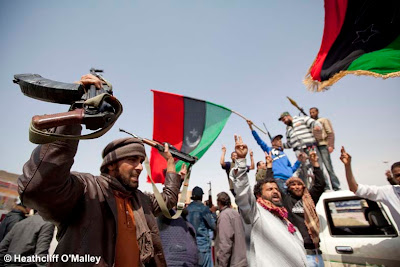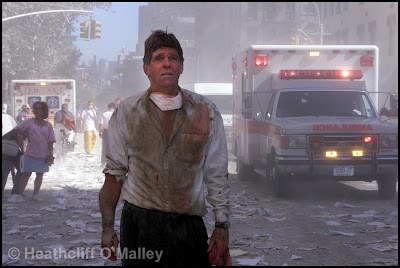Covering the conflict in Libya
I recently returned from an assignment covering the war in Libya, which was a dramatic change from recent years where I have only had the chance to cover conflicts “embedded” with the western military in Afghanistan and Iraq.
It had been a long time since I’d had to employ fixers to take me to the frontline, if there was such a thing as a frontline , and filed my stories from the roof of the car or back at our Hotel instead of a military base . In Libya there was no waiting for the stamp of approval from a British military Unit Press Officer who would check my images for “OPSEC” before being allowed to send my pictures to the paper or ground rules about how to cover the story. Instead myself and the reporter Ben Farmer worked unhindered by the yoke of bureaucracy and used old fashioned reporting skills from our collective years of experience and gut instinct to find our way.
These rediscovered freedoms also unleashed the nearly forgotten dangers of covering such a conflict. At one point we were having to drive for up to four hours from Benghazi to where the Rebel forces gathered on the coastal highway heading towards Gaddafi’s hometown of Sert. Without the advantage of sophisticated communications equipment the only way to find out where the frontline was on a particular day was to edge our way up the highway ( often at 160kms per hour) and stop occasionally to check with rebel fighters whenever we found a group gathered by their pickup trucks, more often than not scrounging for fuel or ammunition This information was of course not always reliable and we would always keep our eyes peeled for other journalists along the way who were often a better source of information. On one occasion we arrived in the town of Bin Jawwad which had only recently fallen back into the hands of the Rebels and the only thing stopping us from driving past rebel lines and into the clutches of Gaddafi’s troops or a hail of 50cal gunfire was our wish to stop and chat with some journalist friends we recognised . Shortly after the whistling of incoming rounds over our heads became the signal for a mass retreat of hundreds of rebel vehicles back in the direction of Benghazi.
Perhaps I’d become somewhat institutionalised by my years of embeds where the greatest threat are invisible IED’S and occasional small arms fire whilst on patrol in dense agricultural land, not sporadic barrages of artillery fire along an open desert road with very little cover and the inevitable and infectious panic of a rag tag rebel force in full high speed retreat that always followed.
It’s for this reason I think that I found covering the conflict in Libya quite intimidating and almost frightening at times. Having no faith in the fighting force you’re with is disconcerting to say the least and to get any real action on a human level that didn’t consist of men lobbing explosive ordnance at one another from a distance of 20kms meant travelling into a kind no mans land where your only cover was the car you came in and if your were lucky perhaps a slight berm of coarse rock strewn sand, factors that I for one found very off putting . This same sand did seem to “dull” the impact of artillery shells though by absorbing much of their force and fortunately the majority tended to fall either side of the highway.
Others it has to be said were braver than myself, possibly for some because they don't as of yet have children like myself, including some of the younger generation of twenty-something photojournalists that have recently arrived on the scene, many of whom are incredibly talented and driven . For many years I’ve been in awe of the Nachtwey, Delahayes and Kozyrevs of the photojournalism world , but there are in fact too many names to mention amongst the list of my contemporaries who are immensely talented and experienced war photographers , some of whom I count as good friends. Soon I am in no doubt there will be many more names to add who are currently in Libya to that list who have come of age in the digital, social networking era who have already begun gracing the pages of some of the more credible publications across the Atlantic and in Europe that still use photography well.
As time went on, just as it had when Rommel and Montgomery were fighting on this same road, fuel also started to become hard to come by. Luckily we found out about a warehouse full of metal jerricans in an abandoned Libyan army base which we filled up with fuel before setting off each day and kept in the boot of our driver’s Chevrolet with our flak jackets. On the road to the “front” we would pass petrol stations with queues of Libyans attempting to fill their tanks by lowering plastic water bottles into opened underground fuel tanks as the pumps had either been sabotaged by the retreating Libyan army or were disabled due to powercuts. There were so many “tourists“ coming up the road each day from Benghazi, often with their kids in tow still euphoric from the recent revolution that they themselves became a strain on logistics and it wasn’t until early April when the Rebels began losing the gains they had made due to the NATO airstrikes and the euphoria subsided that this began to be less of a problem. On one day we found ourselves in an oil refinery trying to scrounge fuel amongst a scene of utter chaos but gave up when we realised quite how many hours we were losing on a fast moving story.
My weeks on the road in eastern Libya were so many thing; challenging, upsetting, sometimes daunting, often frustrating as well as exhilarating and most definitely exhausting.
To bear witness to a small slice of the revolution against Gaddafi was an experience that I shall always remember and may perhaps return to before it's conclusion. There was something quite endearing about the people of Benghazi who welcomed us western journalists with open arms. There was little evidence on the ground of the alleged Al Quaeda elements in their midsts , even though I’m sure there must be the odd Jihadi amongst them., but so what ? The majority, the plumbers, school teachers and university students who’ve taken up arms in their inexperienced and often frighteningly inept hands were incredibly brave to do so and although I do wish them success in achieving democracy and freedom from Gaddafi’s tyranny I do worry at what cost in human suffering.













Comments